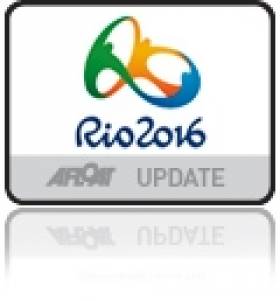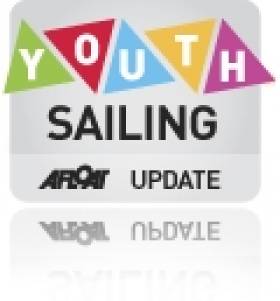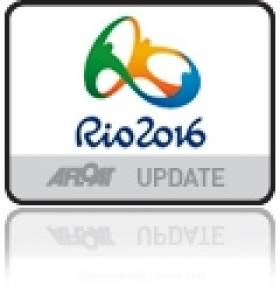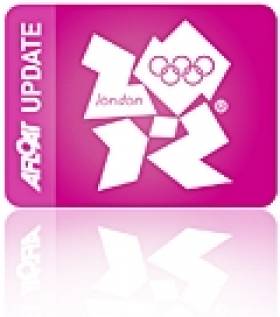Displaying items by tag: International Sailing Federation
#ISAF – Annalise Murphy is down two places to 18th in the latest ISAF World Sailing Rankings published on July 28th. The Dubliner is in Rio for the first sailing test event of the Rio Olympics this weekend. This month she notched up another international win, this time in the Moth class when she became Womens world champion at the Hayling Island based event. London 2012 team–mates Ryan Seaton and Matt McGovern have dropped outside the top ten in the 49er world ranking and now lie 11th. Fellow Belfast sailor James Espey has moved up from 62 to 58 in the Laser class.
49erFX
1. Martine Soffiatti Grael / Kahena Kunze, BRA
2. Ida Marie Baad Nielsenn / Marie Thusgaard Olsen, DEN
3. Sarah Steyaert / Julie Bossard, FRA
49er
1. Jonas Warner / Peter Lang, DEN
2. John Pink / Simon Wheeler / Stuart Bithell, GBR
3. Julien D'ortoli / Noe Delpech, FRA
Men's 470
1. Mathew Belcher / William Ryann, AUS
2. Pangiotis Mantis / Pavlos Kagialis, GRE
3. Sime Fantela / Igor Marenic, CRO
Women's 470
1. Camille Lecointre / Mathide Geron / Helene Defrance, FRA
2. Jo Aleh / Polly Powrie, NZL
3. TIna Mrak / Veronika Macarol, SLO
Men's RS:X
1. Ricardo Santos, BRA
2. Mattia Camboni, ITA
3. Marcantonio Baglione, ITA
Women's RS:X
1. Flavia Tartaglini, ITA
2. Bryony Shaw, GBR
3. Laura Linares, ITA
Laser
1. Tonci Stipanovic, CRO
2. Nick Thompson, GBR
3. Pavlos Kontides, CYP
Laser Radial
1. Marie Bouwmeester, NED
2. Evi Van Acker, BEL
3. Tatiana Drozdovskaya, BLR
Finn
1. Michele Polette, ITA
2. Bjorn Allansson, SWE
3. Thomas Le Breton, FRA
Nacra 17
1. Vittorio Bissaro / SIlvia Sicouri, ITA
2. Ben Saxton / Hannah Diamond, GBR
3. Thomas Zajac / Tanja Chiara Frank, AUT
Full rankings here
Athlete Participation Programme Now Open For 2013 Youth Worlds
#YouthSailing - The International Sailing Federation (ISAF) is now inviting applications to its Athlete Participation Programme for the 2013 ISAF Youth Sailing World Championship in Limassol this summer.
The ISAF Athlete Participation Programme (APP) was created in 2002 and assists athletes with attending the ISAF Youth Sailing World Championship by offering coaching support and financial subsidies towards the entry fee and travel costs. The World Youth Sailing Trust also provides a championship coach.
The APP is targeted at sailors from nations in subscription categories 1 and 2. Priority will be given to new countries and for countries that have not participated in the ISAF Youth Worlds in the last two years.
Thanks to APP funding, sailors from the Cook Islands, Cuba, El Salvador, Serbia, Botswana and Paraguay have been able to compete at the ISAF Youth Sailing World Championship.
The APP allows athletes, via their member national authority, to apply for support in the following three ways:
Event Coaching and Support: Athletes who are not able to travel with a team leader or coach are able to apply for coaching support. The on-site Championship coach will be available for pre and post race briefings and other essential event support.
Entry Fee Subsidy: Athletes may apply for a subsidy towards the event entry fee.
Travel Subsidy: Athletes may apply for a subsidy towards their travel expenses in order to attend the Championship.
All ISAF member national authorities have been sent the ISAF APP Application Form. The form must be returned to the ISAF Secretariat by 5pm on 25 February 2013.
The 2013 ISAF Youth Sailing World Championship will take place in Limassol, Cyprus from 13-20 July 2013. The event is open to competitors aged under 19 in the year of the championship (ie for Ireland, under 19 on 31 December 2013) in the events and equipment listed here:
- Boy's One Person Dinghy - To be confirmed
- Girl's One Person Dinghy - To be confirmed
- Boy's Two Person Dinghy - 420
- Girl's Two Person Dinghy - 420
- Boy's Windsurfer - RS:X with 8.5m2 sail
- Girl's Windsurfer - RS:X with 8.5m2 sail
- Open Multihull - Sirena SL16
- Open Skiff - 29er
Simply getting to the championship is a major achievement for most as entry is limited to one boat per nation, per event, meaning sailors first having to win through their national qualification series.
Entry details have been sent to all ISAF MNAs who are reminded that the deadline for submitting the Boat Reservation Form is 31 January 2013.
Bitter Blow for Kites as Windsurfing is Reinstated in Olympics
#OLYMPICS - Windsurfing has been reinstated in the Olympic Games programme at the expense of new class kitesurfing after a vote by the International Sailing Federation (ISAF) yesterday, as Eurosport reports.
It had been expected that sailing's world governing body would reach a compromise of sorts at its annual general meeting in Dun Laoghaire by keeping both classes in the Rio Games in 2016.
The original decision to replace windsurfing with the new sport of kitesurfing back in May was considered a surprise move, but the ISAF has surprised again with its reversal of that decision.
Windsurfing's supporters were said to be "shell-shocked" by the original vote, and vowed to lobby the ISAF to overturn the decision in Dublin, for which they needed a two-thirds majority.
Israel's sailing head Yehuda Maayan told Reuters that delegates had likely been confused about the original vote because of language difficulties, noting that the Spanish delegate had voted for kiteboarding by mistake.
Among those expressing their disappointment at the about face was Virgin founder Richard Branson, who wrote on his blog that the ISAF had "have misled everybody and been very short-sighted in making this knee-jerk decision".
He added: "Their original decision was the right one and a brave one, although my own feeling is that there is room for both sports in the Olympics. If they had to drop anything it should have been one of the less exciting sailing races, which really don't capture the public's imagination."
The move is also a bitter blow for Irish kitesurfer Claudine Murphy, sister of Olympic star Annalise Murphy, who had been campaigning in the new class to make it a sister act at the Rio Games.
In other news from yesterday's ISAF AGM, new members of the ISAF Council have been announced.
Italy's Carlo Croce was elected president and chair of the council that also includes seven vice presidents: George Andreadis (Greece), Chris Atkins (UK), Adrienne Greenwood (New Zealand), Nazli Imre (Turkey), Gary Jobson (USA), Quanhai Li (China) and W Scott Perry (Uruguay).
Also on the council are a non-voting treasurer (yet to be confirmed), 28 representatives from member national authorities (MNAs) and individual representatives from the athletes' commission, the ISAF classes, offshore sailing and women's sailing. Sailing.org has full details on the new council HERE.
from ISAF
Kiteboards Out / Windsurfing Back In
Dun Laoghaire, Ireland: After three days of meetings, the ISAF Annual Conference drew to a close Saturday as the final decisions affecting the sport moving forward were made.
23 submissions relating to the events and equipment for Rio 2016 were received by ISAF in advance of the Conference. In accordance with the ISAF Regulations, before the detail of any of these particular submissions could be discussed, Council were required to vote on a motion to re-open the debate on the subject. The Regulations specify that 75% of members must agree to the motion.
The submissions were presented as six proposals and Council asked to vote on them in terms of the specific changes they proposed. The first proposal grouped. 26 Council members voted in favour and 12 were against.
Proposal 2, which featured Submission 063-12, related to Men's Kiteboarding, Women's Kiteboarding and 2nd One Person Dinghy - Finn. 14 Council members voted in favour and 23 were against and 1 abstained.
With 38 possible votes, the 75% requirement was not achieved on either proposal so the events and equipment as approved in May 2012 remain for Rio 2016.
However, at the ISAF General Assembly part of the business for the 106 Member National Authorities (MNAs) who were present was to review any regulations made or amended in any substantive way by Council since the last Ordinary Meeting which was in November 2011.
ISAF had been notified of three amendments proposed by MNAs which concerned the first two lines of Regulation 23.1.4 (Men's and Women's Kiteboarding).
As defined in the Articles of ISAF, decisions at the General Assembly shall be taken by a simple majority of votes of those present and entitled to vote. There were 114 possible voters, including the ISAF President and Vice-Presidents.
After a lengthy debate the MNAs approved the first proposal which reinstated Men's and Women's Boards - RS:X.
ISAF Regulation 23.1.4 now reads:
Men's Board - RS:X
Women's Board - RS:X
Men's One Person Dinghy - Laser
Women's One Person Dinghy - Laser Radial
Men's 2nd One Person Dinghy - Finn
Men's Skiff - 49er
Women's Skiff - 49erFX
Men's Two Person Dinghy - 470
Women's Two Person Dinghy - 470
Mixed Two Person Multihull - Nacra 17
sailing.org
#KITESURFING - The International Sailing Federation (ISAF) has responded to the legal challenge from the International RS:X Class Association to its decision to cut Olympic windsurfing from the Rio games in 2016 in favour of kitesurfing.
As previously reported on Afloat.ie, kitesurfing was given two medal events at the next Olympics following a mid-term meeting of the ISAF Council in Italy nearly three months ago.
In a statement, the ISAF said it "intends to fully defend the decision of the ISAF Council, which was made in accordance with the ISAF regulations and the defined decision making processes of the ISAF."
Sailing's world governing body said it was "extremely disappointed that this course of action has been taken" - rather than the "normal submission process" to request the council to reconsider its decision at the ISAF AGM in November - "not least because responding to legal claims will incur substantial and unnecessary legal costs for ISAF and for the class itself."
There has been some controversy surrounding the decision to include kitesurfing over windsurfing at the Rio games after claims that the council vote was married by "language difficulties" among the Spanish delegate.
Spain, a long-time windsurfing stalwart, surprised many by joining the 19-17 vote in favour of the newer discipline, which was supported by Ireland's John Crebbin.
ISAF Posts Review of Development Symposium
#DEVELOPMENT - The International Sailing Federation's (ISAF) inaugural Development Symposium at Howth Yacht Club recently "promised much in the way of passionate discussion", according to its review of the two-day event.
Presentations were given by Tony Wright, training manager of the Irish Sailing Association, who outlined the ISA's national programme that keeps the focus of the sailor "at the centre of all that they do"; and Simon Jinks who walked through his new Guide to Offshore Personal Safety for Cruising and Racing.
Meanwhile, World Youth Sailing Trust coach Hugh Styles spoke on the subject of cohesive training programmes adding value to international events and leaving a legacy for host nations and teams alike.
Participants from the federation's member nations kept an 'ideas bank' which listed development ideas for future consideration, including a proposal for a development forum for sailing coaches, and using the model of the European Qualifications Framework as a reference for coaching competencies.
New Zealand, South Africa, Iceland and Turkey were also suggested as locations for future symposiums.
For more see the full review of the Development Symposium at the ISAF website HERE.
Dublin Hosts First ISAF Development Symposium in March
#DEVELOPMENT - Representatives from the International Sailing Federation's member nations throughout the world will meet at Howth Yacht Club from 17-18 March for the inaugural ISAF Development Symposium.
The aim of the two-day conference is to develop the criteria and future strategy for sail training and development within the governing body of world sailing, based on three core requirements:
- Fulfilling requirement set out in the ISAF Constitution to develop the sport and increase participation;
- Providing a structure for the sport to grow to meet expectations of the International Olympic Committee; and
- Supporting member nations in growing the sport in their own countries.
"Training is the key that will unlock and secure the future for our sport," said the ISAF in its development statement at the federation's annual conference last year.
Dublin was chosen as the host location for this first symposium as it will be hosting the ISAF Youth Worlds in July, just before the 2012 Olympic Games in London.
The international delegates, chaired by event organiser and ISAF training and development manager Dan Jaspers, will be supported by a group of ISAF representatives such as vice president Nazli Imre, development and youth committee chairman Olivier Bovyn, ISAF-nominated experts and the World Youth Sailing Trust coach, as well as invited specialist technical advisors.
More information about the ISAF Development Symposium is available HERE.


























